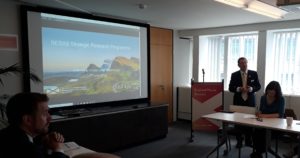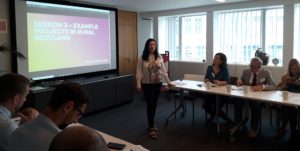On Thursday 7 June 2018, a workshop on how to enhance innovation in Scottish rural areas was organised and hosted by the Scottish Representation to the European Union in Brussels. The focus was on examining the Scottish perspective on Rural Innovation, and looking forward with the recent launch of the Rural Innovation Support Service (RISS) – a Scottish Rural Network initiative. This workshop offered a follow-up to the 11th OECD Rural Development Conference in Edinburgh in April.

Kicking-off the workshop, Jose Enrique Garcilazo from the OECD reminded the audience of why innovation is important for the economy, especially in rural areas. According to OECD data, rural economies are very productive in the service areas in particular but lack the benefits scale and are exposed to the variabilities of global trade. Innovation is seen as the key to remain competitive and the digital transition is an opportunity for rural areas with decentralised production and work spaces. The OECD representative identified knowledge transfer and absorption as a big challenge for rural areas which is why it is focusing on the promotion of SMEs, entrepreneurship, connecting local and global value chain, as well as rural-urban interlinkages. The urban model cannot be duplicated in rural areas without creating dependencies and the OECD is urging policymakers to change their mindset regarding rural areas. Some of their recommendation can be found in the OECD’s Rural Policy 3.0 framework or in the 2018 Edinburgh Policy Statement.
 To support innovation in rural areas, the European Innovation Partnership for Agricultural Productivity (EIP-AGRI) has implemented an interactive innovation approach through the support of local operational groups co-creating and leading practical innovation. The EIP-AGRI has a brokering function as well as a dissemination role. The legislative proposals for the future CAP put an emphasis on innovation, as a new cross-cutting objective. In Scotland, the newly created Rural Innovation Support Service (RISS), part of the Scottish Rural Network, embraces this approach completly and acts as a network between different stakeholder groups to help innovation emerge across the rural economy in Scotland in a meaningful way. They work closely with EIP-AGRI as their aim is also to support the creation of operational groups. Amongst its partners, the RISS is working with the Scottish Environment, Food and Agriculture Research Institutes (SEFARI) and the research teams in the 5-year Scottish Government Strategic Research Programme. This provides access to relevant expertise to support the rural innovators and guidance with development of their project plans.
To support innovation in rural areas, the European Innovation Partnership for Agricultural Productivity (EIP-AGRI) has implemented an interactive innovation approach through the support of local operational groups co-creating and leading practical innovation. The EIP-AGRI has a brokering function as well as a dissemination role. The legislative proposals for the future CAP put an emphasis on innovation, as a new cross-cutting objective. In Scotland, the newly created Rural Innovation Support Service (RISS), part of the Scottish Rural Network, embraces this approach completly and acts as a network between different stakeholder groups to help innovation emerge across the rural economy in Scotland in a meaningful way. They work closely with EIP-AGRI as their aim is also to support the creation of operational groups. Amongst its partners, the RISS is working with the Scottish Environment, Food and Agriculture Research Institutes (SEFARI) and the research teams in the 5-year Scottish Government Strategic Research Programme. This provides access to relevant expertise to support the rural innovators and guidance with development of their project plans.
Apart from operational groups, other examples of rural innovation in Scotland were highlighted in very different contexts. The Rural Leadership Programme is a challenging programme led by Scottish Enterprise, aimed at business managers and employees from rural businesses who have a desire to develop their leadership skills and grow their business. One of the leaders trained by this programme, Anna Black, presented her successful project of diversifying a family farm into a destination of excellence for tourists and horse riders (see Lindores Luxury Holiday Accommodation website here). In contrast, Garth Entwistle presented a community initiative and the history of the Udny Community Trust and wind turbine. They are proud of being the first community-owned, operated and financed wind turbine on mainland UK, with a return on investment which is ten times greater for the community than private investments would have been.
 The H2020 SIMRA project is coordinated by the James Hutton Institute located in Aberdeen, Scotland. Maria Nijnik, the coordinator, presented the project during the event which nicely echoed with the general message of the day. Indeed, SIMRA seeks to bridge the gap between researchers and practitioners by advancing knowledge of rural innovation while supporting emerging innovation on the ground through its Innovation Actions and database of good practices. The database comprises more than 300 entries, with examples in Scotland including community energy, social farming and rural services.
The H2020 SIMRA project is coordinated by the James Hutton Institute located in Aberdeen, Scotland. Maria Nijnik, the coordinator, presented the project during the event which nicely echoed with the general message of the day. Indeed, SIMRA seeks to bridge the gap between researchers and practitioners by advancing knowledge of rural innovation while supporting emerging innovation on the ground through its Innovation Actions and database of good practices. The database comprises more than 300 entries, with examples in Scotland including community energy, social farming and rural services.










